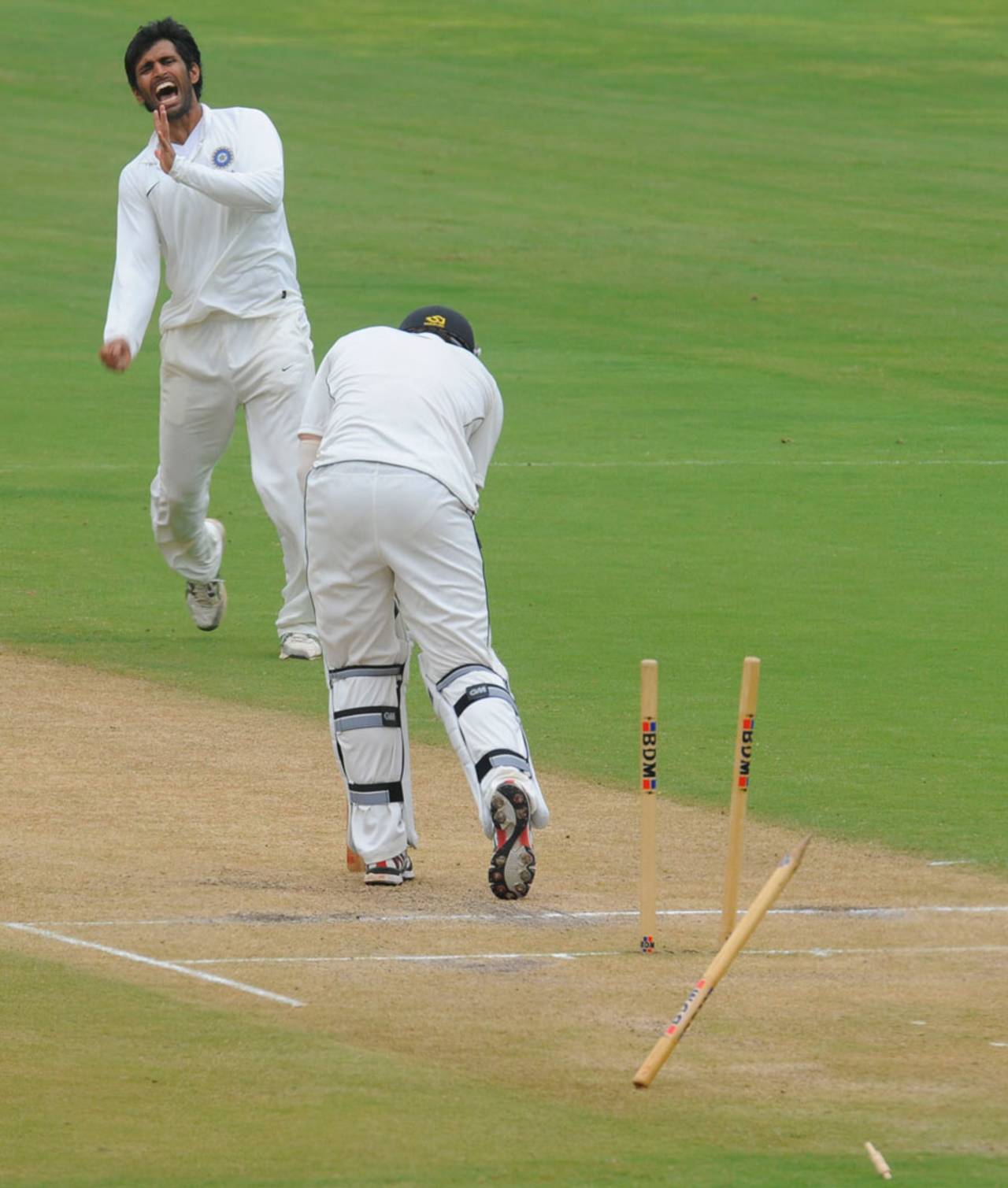Jharkhand
had collapsed from 144 for 4 to 180 for 8. Despite their four-man attack, excluding Abhishek Nayar, having a collective experience of 25 first-class games, Mumbai had justified their decision to bowl. You would expect the defending champions to fire out the last two wickets of a side promoted from the bottom group. That was what Mumbai sought to do. Only, they gave themselves just one or two deliveries per over to try and dismiss No. 10 Shankar Rao. For, a proper batsman, Saurabh Tiwary, was batting at the other end on a hundred, and there was no way Mumbai were going to set attacking fields for him; it seems modern captaincy prohibits a team from attempting to dismiss the specialist batsman if a tailender is also in the middle.
Tiwary was given a field of up to eight fielders manning the boundary, something that took away the catching positions completely. Even when that number dipped on the rare occasion, it never went below five. Javed Khan, Mumbai's most successful bowler on the day, said the plan was to give Tiwary the single and go for the tailenders' wickets. The plan worked superbly, for Tiwary and Jharkhand. Knowing that Mumbai had no interest in targetting him, he duly bashed out 175 from 264 deliveries. Rao rose to the occasion as well. Knowing that a ball or two was all he would have to face every over, he duly blocked everything that came his way. By stumps, Rao had two scoring shots in 64 deliveries, and the partnership had stretched the score to 262.
Apparently, the field had been spread not only because Mumbai wanted Rao on strike, but also because Tiwary was in an attacking mood. Again, the approach played right into Tiwary's hands. All those boundary riders could only watch as he deposited eight sixes into the stands over their heads. He also hit 17 fours, most of which came in the first two sessions when Mumbai were often getting wickets.
Numbers 7 and 8 threw their wickets away. Had they not, Jharkhand might well have been only six or seven down, for Mumbai had already decided wickets would likely come only from the end opposite to Tiwary's.
They did try to get him early, when he came in at 13 for 2, with a bouncer barrage. Long-on, deep midwicket, deep square leg, and fine leg. But Tiwary survived. Not only did he survive, he also punished the length when Mumbai overdid it. But Mumbai weren't going to learn. They had come up with Plan A, and Plan A they were going to persist with through the day.
About the closest the tactic came to success was when Tiwary top-edged a hook which stayed in the air for a while before rolling very fine into the boundary. Buoyed, Mumbai turned to the short ball again and again. And Tiwary kept hooking, pulling or ducking with increasing confidence.
He also farmed the strike superbly, regularly taking a single off the fourth ball of an over. Despite this becoming a pattern for as long as an entire session, captain Nayar did not bring the fielders in to force Tiwary to try harder for that single. The batsman had the entire outfield for the taking, to push or nudge wherever he needed. Mumbai's stubbornness was absolute when, in the first over with the second new ball, Nayar had six men in the deep for Tiwary.
Nayar is not the only Mumbai captain to turn so defensive in recent times. In the 2011-12 Ranji
quarter-final against Madhya Pradesh, Wasim Jaffer had seven men on the boundary for a No. 8 batsman. MP were 171 for 9, but Mumbai were prepared to give No. 8 the single to get at No. 11.
As well as Tiwary and Rao played, the inexperience of Mumbai's attack also contributed to the home side's lack of penetration. When your allrounder brings himself on in the 11th over of the match despite having three specialist seamers to choose from, something has to be wrong. While Shardul Thakur went overboard with the short ball, often misdirected, it was the tall left-armer Akbar Khan, playing only his second game, who was the weak link. He bowled only nine, largely unthreatening overs with the first new ball, and none with the second. Nayar sent down as many as 16, and was quite unfortunate to not pick up a wicket or two. When you go so defensive as captain, though, you are setting yourself up for misfortune.
Abhishek Purohit is a sub-editor at ESPNcricinfo
